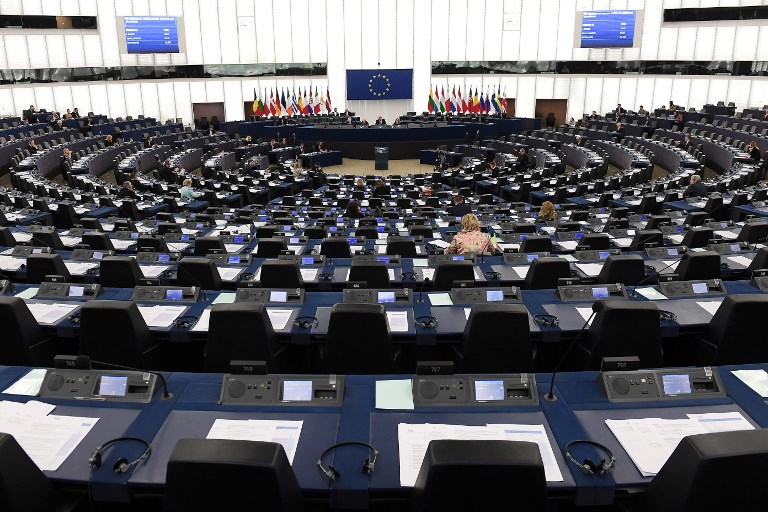The European Parliament has approved the disbursal of another 1 billion euros in financial assistance for Ukraine to help the country service its debts and to provide incentives to Kyiv to step up its reform efforts.
A total of 527 out of 680 MEPs voted to approve the aid for Ukraine on June 13. The European Council now has to give its approval.
But the aid is conditional on Kyiv continuing to make progress on key reforms, the parliament resolution approving the aid warns.
“In light of the unfulfilled conditions in the fight against corruption and the related cancellation of the third installment of the previous program of macro-financial assistance under Decision (EU) 2015/601, the European Parliament, the council and the commission underline that further macro-financial assistance will be conditional on progress in the fight against corruption in Ukraine,” the parliament’s resolution on the aid reads.
“To that effect, the economic policy and financial conditions of the Memorandum of Understanding to be agreed between the European Union and Ukraine shall include inter alia obligations to strengthen the governance, the administrative capacities and the institutional set-up, in particular for the fight against corruption in Ukraine, notably regarding a verification system for asset declarations, the verification of companies’ beneficial ownership data, and a well-functioning specialized anti-corruption court in line with the recommendations of the Venice Commission.
“Conditions on combating money laundering and tax avoidance shall also be considered. In line with Article 4(4), where the conditions are not met, the commission shall temporarily suspend or cancel the disbursement of the macro-financial assistance.”
After the vote, the spokesman of the European People Party Group (EPP) in the International Trade Committee, rapporteur Jarosław Wałęsa, emphasized that the aid should not be seen as “unconditional support.”
“There are firm conditions to ensure that this money will serve economic stabilization and support the reforms,” Wałęsa said. “It’s very important to recall that the European Commission canceled the last tranche of the 3rd macro-financial assistance program when some commitments were not fulfilled by Ukraine.
“Therefore, it’s crucial that the two unfulfilled anti-corruption measures be part of the new conditions. If corruption is not radically addressed, macro-financial assistance funds should not be delivered to Ukraine. Our common goal is to help Ukraine, but we need to closely follow the situation and breathe down their necks.”
Another EPP Group spokesman, Michael Gahler from the Foreign Affairs Committee, stressed that his committee expects Ukraine to take concrete steps: “For the citizens of Ukraine, the fight against corruption and for democratic institutions is the top priority, together with the war in the Donbas. We support the modernization and European choice of Ukraine.
“As a consequence, and in exchange for our financial assistance, we expect the correct legal establishment of the High Anti-Corruption Court within the next two weeks, and we demand the lifting of the asset declaration obligations on civil society activists and the limitation of these to public officials, as well as there to be a politically-balanced composition of election commissions.”
Ukraine’s parliament on June 7 went some way to meeting those conditions by approving legislation on the establishment of an anti-corruption court. Ahead of that vote, the European Parliament made it clear that its approval of further aid for Ukraine was contingent on Ukraine’s parliament voting to set up the body.
“We have high expectations that the final vote on the High Anti-Corruption Court will take place this coming Thursday as planned. However, if this is not the case, and given the already long delays in the implementation of this important element of the anti-corruption institutional architecture, we decided that the legislative text on the macro-financial assistance (for Ukraine) should be withdrawn from the agenda and not put to vote in the European Parliament next week in Strasbourg,” a parliament statement read.
The European Parliament’s approval of the aid to Ukraine will next be confirmed by the European Council, a move that is expected to come on June 26. After that, the European Commission and the Ukrainian government will sign a memorandum of understanding on the provision of the assistance, which will formally set out the conditions under which Kyiv is to obtain the money.
The first tranche of the macro-financial assistance could be disbursed at the beginning of autumn, EU officials said.



